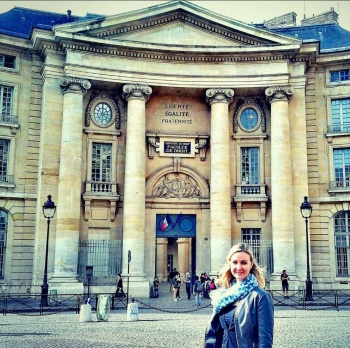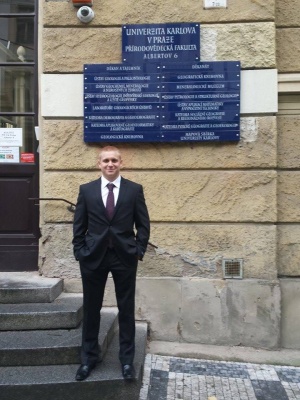Chloe Hewitt • foto: Peter Plešivčák, Veronika Vitáčková • 2 November 2017
Why or Why Not Erasmus?
Making the decision to spend a year away from home to study at a university in another country is a big step for a student, but is a choice available to many thanks to the Erasmus programme which celebrates its 30th anniversary this year. The ability to study abroad not only means students can learn how education differs elsewhere but also enables them to experience different cultures as well as character-building that could shape a lifetime. Chloe Hewitt, from De Montfort University in Leicester, England, spoke to two students from Charles University in Prague, one of whom has taken part in the Erasmus programme and one who has not.
Veronika Vitáčková and Peter Plešivčák are both students at Charles University who are now working for its Erasmus team to support students as they make one of the biggest decisions of their student life. Veronika is a Law student who spent a year in Paris at the Pantheon-Sorbonne University, whilst Peter studies Geography and decided not to take up the opportunity of a year abroad.
“It was the best experience I have ever had, the best year of my life,” said Veronika. She decided she wanted to take part in the Erasmus programme as it gave her an opportunity to learn French and for the future it would look good on her CV. The chance to move away from home and meet new people was another big part of her taking part in Erasmus. As well, seeing how education works in another country interested Veronika, which this scheme allowed her to experience first-hand. 
In addition, the chance to study at the prestigious Pantheon-Sorbonne Law School, which has produced a number of CEOs of major corporations, Prime Ministers as well as people who have held a number of other political positions around the world was another incentive for her.
Despite all the positives, Veronika felt that the scheme is not without its problems. For her, the biggest issue, which also puts many students off taking part, was the amount of papers and applications that had to be filled in with issues cropping up as a result. As well, she was given 500 Euros a month from the Erasmus grant, provided by the EU and the Czech government, but 450 of that went on rent, meaning she had to ask her parents to give her money so she could deal with the living costs as living expenses are much higher in Paris than in the Czech Republic.
Yet, regardless of the problems that she had during her year out, Veronika is happy she spent the year in Paris and is appreciative for what she gained as a result of it. “It was my dream,” she said matter of factly – a dream which was fulfilled thanks to Erasmus.
Peter, on the other hand, did not take part in the Erasmus programme but in hindsight wishes that he had taken the opportunity to do so when he had it. “I always had a job and did not want to quit it,” the Geography student explained, adding that it was at a pretty good place with decent money and he did not want to risk not getting his job back on his return if he had gone abroad on an Erasmus year. 
It is a dilemma that faces many students, and Peter was further put off by the application that had to be filled out.
Issues with his education when he was younger also played on Peter’s mind when the idea of taking a year abroad cropped up. Having come quite close to being kicked out of school in his younger years, Peter did not feel it was appropriate to have a year away and decided he should instead focus on his education at home.
As Veronika experienced first-hand, Peter was concerned about the much higher living costs elsewhere in Europe and did not want to create a financial strain for himself or his family by asking them to help with his finances.
However, now in his final year at Charles University, he realises it probably would have been better for him to have taken part in the Erasmus programme even though, at the time, it was not for him. He acknowledges his studies would have benefitted from the opportunity. As for the future, he fears that he could be negatively impacted by having not gone abroad but said he will tackle those issues when he is faced with them.
Over the past 30 years, Erasmus has given more than 9 million students the chance to study, train, volunteer or gain professional experience abroad. In its current form,
Erasmus+, it has stronger links than its predecessor programmes, enabling students to spend traineeship periods in companies or organisations abroad and through non-formal learning experiences preparing young people for life after studies.
Erasmus in its current format is set to run until 2020 when it will be reviewed again.
Veronika and Peter strongly encourage other students to take part in Erasmus – or other exchange programmes for that matter – as it is an opportunity that will not only benefit their studies but also social and life skills that will last a lifetime. They say the chance to embrace a different culture is there for students to take and it should be grasped with both hands for a chance they may not be offered again.
|
Chloe Hewitt is a Journalism student at De Montfort University in Leicester, England. She is passionate about sports and has an interest in current affairs. Chloe hopes that this opportunity to have contributed to iForum has given her a better insight to Czech culture, whilst providing an opportunity to venture into a different aspect of journalism which can be of use in the future. |
